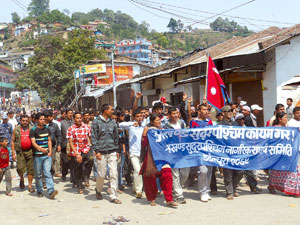 PICS: SUNIL POKHAREL TO EACH ITS OWN: Tharu community in Attariya demanding Kailali and Kanchanpur to be split from the Far West .
|
If anyone still had any doubt that the delays in finishing the constitution was never about ideological differences between the parties, and more about give-and-take over power sharing, Tuesday's agreement should have put those doubts to rest.
We have decided on a mixed form of governance not because that is what the country needs, but just so Pushpa Kamal Dahal can become the next directly-elected president. To let him do that we have closed our eyes to all sorts of complications that can arise from dual power centres of having the parliament elect a prime minister, and the people elect a president. And this is supposed to put an end to political instability caused by a parliamentary system?
The number of states, their boundaries and what to call them have always eluded consensus. But this week we suddenly have an agreement on a 11-state model with names and territories of the provinces to be decided later. We would have liked to believe that the decision on 11 states was an outcome of serious discussion among academics and experts. But like the form of governance, it was just a part of the package deal on power-sharing.
The parties cut themselves a political deal, and voila all contentious issues on the constitution were suddenly resolved. This is always how decisions have been made in this country. Not, as we naïvely believed, because the parties had woken up to the urgency of meeting the constitution deadline, or because they were concerned about the country's future.
It is becoming clear that if the Indian ambassador had not speeded up the power sharing deal among the parties, they would be squabbling till D-day and beyond. It is pointless to lament foreign interference when our leaders are so hapless. If we don't clean up our mess, our neighbours will do it for us. But Tuesday's agreement sets a bad precedent: the ambassador of a foreign country midwifing a new government in the parlour of the chairman of the largest political party. Where else on earth does this happen?
And so it is with the Europeans and their stoking the discontent of ethnic pressure groups. Members of the Janajati caucus in parliament are recipients of foreign funding and the caucus has now become a parallel power centre beyond the control of parent parties. Will the donors take responsibility when, instead of giving a political voice to Nepal's marginalised, their money directly contributes to taking Nepal back to the days of squabbling fiefdoms?
To be sure, there are lots of things that need fixing. Caste, gender and ethnic discrimination are rife despite laws against them. The civil service and security agencies have a disproportionate number of people from the traditionally dominant groups. But there are ways to deal with social injustice, and they don't include weakening our national unity and shredding our social fabric.
A constitution is not just about content, but also about process. What is the point of having a CA if the constitution was going to be written by a dozen priests behind closed doors? Far from reflecting the aspirations of the Nepali people, it seems our CA members and leaders will stand for the interests of donors and pressure groups to which they have sold their loyalties. Last week's Himalmedia poll shows that the caucus and other proponents of ethnic federalism are out of sync with public opinion even among their own communities.And this is why federalism, when it is finally instituted, will not improve things. We are going to remain a country that will have top-down governance, except that instead of having one centre we are now going to have 11.
A strong, united and independent Nepal hardly seems to be on anyone's priority list. We are too busy fighting amongst ourselves to notice what we have lost. This is exactly the kind of situation demagogues hope to get us into so they can benefit from the chaos and anarchy.
Read also:
Damage control mode
After a people's war, BIHARI K SHRESTHA
We can have federalism if we must, but it is guaranteed to keep Nepal poor
Fooling some people all the time, ANURAG ACHARYA
A new constitution may eventually be declared on 27 May but the compromised document will leave many dissatisfied




